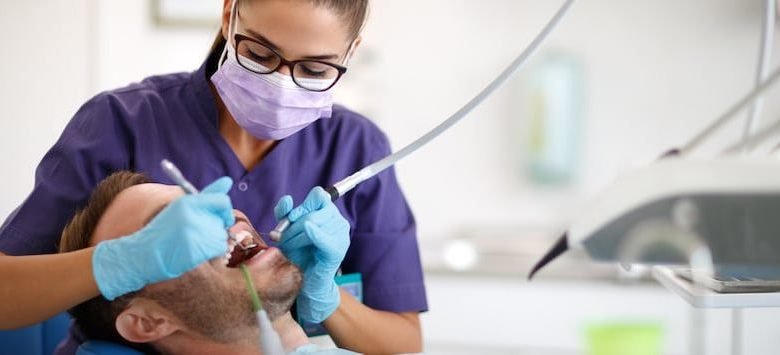What is the Work of a Dental Hygienist Toronto?

If so, a career as an oral hygiene dentist might be right for you. You might be wondering the following if you’re thinking about working as a Dental hygienist Toronto: What specific duties does a dental hygienist perform every day? If you pursue this career, some of the most common roles, responsibilities, and tasks are listed below. We also talk about how to become a Dental hygienist in Toronto, including the possibility of earning a bachelor’s or associate’s degree in the field.
The Most Important Tasks of a Dental Hygienist
Dental hygienist Toronto is crucial to the health and happiness of their patients. They are an important part of the dental hygiene puzzle for the majority of patients because they help the dentist perform important tasks like the ones listed below.
1. Reviewing Dental and Health History
Before the hygienist or dentist performs any dental work, the hygienist must take a medical history. Dental hygienist Toronto uses this review as a crucial tool to:
Understand the patient’s previous dental work and medical conditions, as well as any changes in their overall health, allergies, or prescription medications. Assess any oral health risks. Prevent medical emergencies. The hygienist and dentist will use the information gathered during this history to develop a customized treatment plan for the patient’s teeth.
2. Before the Dentist Performs Any Work
Hygienists actively screen patients for tooth decay and oral disease in addition to collecting a dental health history.
Although it only takes a few minutes to complete, this step is crucial to the process. A Dental hygienist in Toronto can find problems before they get out of hand by taking a quick inventory of the head, neck, and mouth.
3. Conducting Dental Cleanings
You are probably most familiar with the dental cleaning part of a dental hygienist’s job.
To remove tartar, stains, and plaque from teeth, hygienists use a variety of tools and methods. By preventing cavities and tooth loss, they also help their patients achieve the bright, beautiful smile they want and help them keep their overall health in check.
4. Taking Dental X-rays
Preventative care relies heavily on dental x-rays. These x-rays are taken by hygienists so that they can identify issues early on and address them before they become more serious. The dentist can also use dental x-rays to find cavities, gum disease, infections, and even some kinds of tumors.
Depending on the patient’s dental health, age, the risk for oral disease, and whether or not they show signs of dental problems, the frequency of x-rays will vary. However, they are a typical aspect of the job of a dental hygienist.

5. Applying Preventive Care
After cleaning, hygienists educate patients about how to take better care of their teeth and gums. In the time between appointments, preventative measures like applying sealants and fluoride play an important role in maintaining dental health.
Because fluoride protects teeth from acid erosion and strengthens them, fluoride treatments are crucial. Additionally, fluoride has the potential to reverse early decay.
Sealants are helpful for controlling decay in particular parts of the mouth, especially for children. The chewing surfaces of the back teeth are protected by a material that resembles acrylic called a dental sealant.
6. Teaching Good Dental Hygiene to Patients
Patient education is an essential part of the job of a dental hygienist. Hey are effectively promoting public health by instructing their patients on the most effective ways to take care of their mouths. Oral hygiene dental teaches patients of all ages how to brush and floss their teeth correctly and emphasize how important it is to do so. They might talk about how diet affects oral health and offer suggestions for toothbrushes and other oral care tools for patients to choose from.
7. Dental hygienists help patients
Improve and maintain good dental health by promoting healthy habits and behaviors. This is consistent with the significance of patient education. Patients are more likely to keep their teeth in good health if they know how to do things right.
8. Hygienists Act As a Link Between the Patient and the Dentist
Documenting care and treatment as it is given and communicating with the dentist. The hygienist presents the dentist with the results of the patient’s teeth cleaning and oral disease screening. By educating patients about their findings and outlining potential treatment options that the dentist may recommend or pursue, the hygienist prepares patients for their visit with the dentists in Toronto. Additionally, they will examine any issues that require further attention from the dentist.
The documentation of that care and treatment is just as crucial as the actual care and treatment that a dental hygienist in Toronto provides. Because they keep track of everything that is discussed and performed during your visit, dental hygienists play a crucial role in the creation and upkeep of dental records.
How to Become a Dental Hygienist in Toronto?
If dental hygiene in Toronto sounds like a job you’d like to have, there are steps you can take to help make it happen.
You will need to be licensed by the state in which you want to work to become a dental hygienist in Toronto. While a license is required in all states, the requirements vary from state to state. A bachelor’s degree or more advanced degree can make it easier to advance your career and earn an even higher salary, but an associate’s degree from an accredited program is the minimum education required to become a dental hygienist.
Many Options for Protecting Your Oral Hygiene
There are many options for safeguarding your oral hygiene dental. You can avoid serious oral problems or get rid of them early by using the methods listed below.
1. Mouth Guards/Sports Guards
Mouth guards, also known as sports guards, can help you avoid a variety of oral issues and protect your mouth from harm. They are typically made of tough plastic shields and can be used for a variety of sports, including:
The hygienist will make impressions of your teeth for sports like basketball, football, skateboarding, hockey, biking, and other activities that could hurt your mouth. You will get the mouth guard that is made just for you in a few days.
2. Sealants are Substances or Resins
Sealants are substances or resins that are applied to the biting surfaces of premolar and molar teeth to fill in deep grooves. It lowers the likelihood of tooth decay.
However, not everyone is a good candidate for this preventative measure. If you want to know if this method is right for you, talk to a Dental hygienist in Toronto.
3. Tips for Brushing
Use toothpaste with fluoride in it. Your teeth may be spared from decay and cavities thanks to the fluoride in your toothpaste. Enhancing the tooth’s hard outer layer reduces decay.
- Allow the bristles to clean your teeth and gums by moving them toward the gum line.
- Use a gentle circular motion to brush your teeth.
- Brush your tongue as well.
- Periodontal diseases can be avoided by using toothpaste that contains fluoride.
- Utilize dental floss, a brush made just for it that is suggested by a dentist.
- You can also try using a water flosser or a needle in a floss dispenser.




